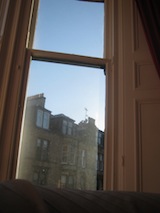 |
 |
 |
Có a dh’ éireas anns a’ mhadainn
‘s a chì ròs geal am bial an latha?(Who rises in the morning
and sees a white rose in the mouth of the day?)Somhairle MacGill-Eain (Sorley MacLean)
Of all our lost times, early mornings are perhaps the most elusive, half-lived in the stupor of reflex. I wonder if we can win them back by trapping something of their singular configurations.
For a long time I went to bed late. That had to stop. I am much more alert in the mornings and – in theory at least – can make better use of my time then. Last night I was up past midnight, so I set my alarm for 6.30 instead of 5.30. Or so I thought, but the referee of habit must have over-ruled the linesman of decision, and I didn’t even realize the mistake until I had already got yanked my legs over the side and made it to the bathroom.
So I shuffled into a dressing gown, made my usual pot of coffee and climbed into the sleeping bag on the sofa, for, like yesterday, there was a tickling chill in the air. It was too dark to read in bed, but here, in the living room, I had a good lamp, and a handy table. Waiting for me, as yet unopened, was Ghost Works by Daphne Marlatt, and I settled down to enjoy the first few chapters.
I bought it last year, after being intrigued by the discussion of it by Justin Edwards and Rune Graulund in their Mobility at Large as an example of an experimental travel narrative. It tells its story almost in slow motion, dwelling on the small details of sensations and thoughts. In the first chapter, the sentences tend be short, but the links between paragraphs – laid out on the page so that each one begins directly below where the last one ends – give it a train-like flow, while in the second, the impressions follow as successions of long clauses, joined with ampersand after ampersand.
My thoughts began to drift. I kept having to go back a few lines and re-read, sometimes aloud, to keep my concentration aloft. Occasionally I looked up to see the outline of the building opposite – chimneys, dormer windows, TV aerials – take shape against the sky, at first a pale grey, and then – suddenly, it seemed, though half an hour had passed – arrogantly blue, embossed with neat strokes of cloud.
Also on the table was a world atlas. It was useful when I was reading the book I just finished – Pankaj Mishra’s Butter Chicken in Ludhiana – because many of the Indian placenames were unfamiliar to me. Now I found myself tracing Marlatt’s journey from Mérida to Progreso.
At around 7 o’clock and on cue the man with Tourette’s – a familiar figure round these parts, unmistakable with his briefcase and signature fedora – became audible, shouting insults and obscenities as he rounded the corner and made his way down the street below my window. ‘Arseholes!’ I heard, just before he merged into the now mezzo-forte rumble of traffic on the main road.
The next time I paused, I realized it had taken me two hours to read 22 pages. Car doors slammed, shutters released, footsteps hocketed on the pavement and on the floorboards above. Water started to gush and squeal in the pipes. He’d be getting up now, I thought. His mum would be making his breakfast and packing his lunch-bag, despairing, perhaps, at the length of time it takes him to get his socks on.
The phone rang. It was not a number I recognised and I didn’t answer it. The caller hung up halfway through the recorded voicemail message. Heaving myself back on the sofa, I knocked over the coffee, and cursed. I wiped up the mess with a discoloured scrunched ball of paper towels still lying nearby from an almost identical accident two days ago.
This time I took it through to the kitchen and disposed of it properly. And while the bath ran I returned to my nest and picked up a philosophy book I borrowed from the university library. It was The Persistence of Subjectivity, a collection of essays by Robert Pippin on post-Kantian philosophy. I began the chapter on ‘Gadamer’s Hegel’, picking up the argument here and there, but much of it sailed past me like a convoy of buses heading back to the depot.
He’d be heading out to the school bus – walking down the hill today, because his scooter was here, ready to assist his more strenuous voyage in tomorrow. Meanwhile the chatter and laughter of schoolgirls began to fill the street as they ambled past reminding me the water must be ready for my dip.
I closed my Pippin, rolled up the sleeping bag, and prepared to make my appearance on the balcony of the day ahead, already planning what I was going to write at the laptop on the table when I emerged from the steam.

